Podcast: Play in new window | Download (Duration: 29:38 — 27.1MB)
Subscribe: Apple Podcasts | Spotify | iHeartRadio | Email | RSS | More
“You boys, settle down.”
“Stop that foolishness.”
“Behave.”
Whenever Stanley and I were together those were common refrains from the adults observing us. It happens. When you’re kids.
We didn’t feel foolish. In fact, we felt quite smart. And wondered if cutting up and laughing out loud was foolish, then wisdom wasn’t likely going to play any part in our future.
Today I don’t ascribe the same meaning to those phrases. I’m very settled. Down. And hopefully, I’ve stopped most of my foolishness. Truth is, I never did feel very foolish because I was mostly a sober-minded kid. That last admonition is one I’ve delivered more than any other. “Behave,” can mean a variety of things depending on the situation. That’s why I love it so much. It’s universally applicable.
I loved laughter and levity as a kid. Still do. I confess I don’t engage in either one as much as when I was a kid, but the innocence of childhood helps. The burdens of adulthood don’t.
Making people laugh used to be an ongoing quest. Provoking laughter was a major investment of our time. Not all kids did it, but we did.
Jim Valvano gave an impassioned speech when he accepted a 1993 ESPY award. He was dying of terminal cancer, but in normal form, he delivered his speech with enthusiasm. Part of his speech included the admonition for people to love, laugh, cry and think. Every day. I do.
I know not everybody does. But I also know not everybody is wired to be as prone to these emotions as I am. Maybe better said, not everybody is wired to be as expressive about these things as I am. I don’t judge people. We’re all different. In how we feel and how we express those feelings.
Love, laughter, and levity aren’t personality traits. They’re part of the human condition. For each of us. How they’re expressed varies based on our personality. Our personality also largely influences how pervasive they are in our lives.
There are some distinct differences in these things and I can’t fully explain why I’ve coupled these three L words. Of the three I suspect levity may cause the most disagreement or debate.
Levity has one particular definition that I’m drawn to.
the treatment of a serious matter with humor
Some likely think of levity as the opposite of being sober. I don’t see it that way. And I don’t see it as disrespectful. I think levity can be disrespectful, but so can laughter. Context matters.
I’m using each of these words, separate and together, in the most positive way. I admit it’s easier to see love and laughter that way. Levity isn’t nearly as common a word and I suspect people largely think of it as immature behavior. Maybe it is, but I still think it can add a powerfully positive force to our life.
Some of the times where levity has been most common in my life are during times of drama. Funerals. Hospital visits. Visiting people suffering some tragedy. That’s why I lean mostly on that definition of levity – “the treatment of a serious matter with humor.” Levity is complex. And quite complicated. Of the three L words, it’s the one that requires the greatest skill. And not everybody can initiate it or even participate in it. Some people are very awkward about it. It’s one of the most uncomfortable things for me to witness. Somebody attempting to inject levity, but failing miserably. And most have no clue that they’re getting it so wrong.
“I’m so lonesome I could cry” is sometimes replaced with “I’m so lonesome I need to laugh…so I don’t cry.” Properly used levity is a tension breaker. Improperly used it’s awkward, disrespectful, or embarrassing.
Watch any standup comedian. Preferably a good one. It’s highly likely they’ll incorporate levity on some very serious or dark subjects.
Decision making is the worst pic.twitter.com/YbzQn5v27m
— ??Omar (@Omar_pets0) September 21, 2022

Please tell a friend about the podcast!
